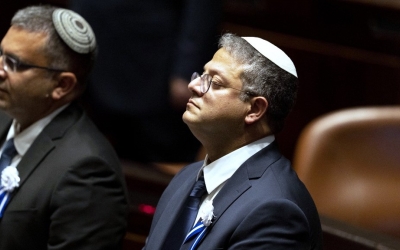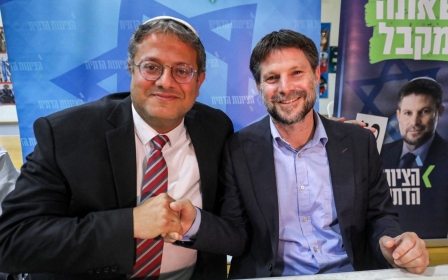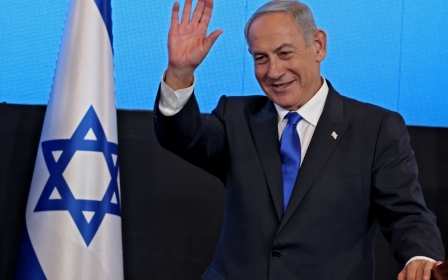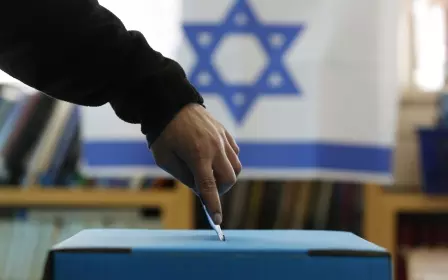Israel’s new far-right coalition deepens divides among Jewish Americans
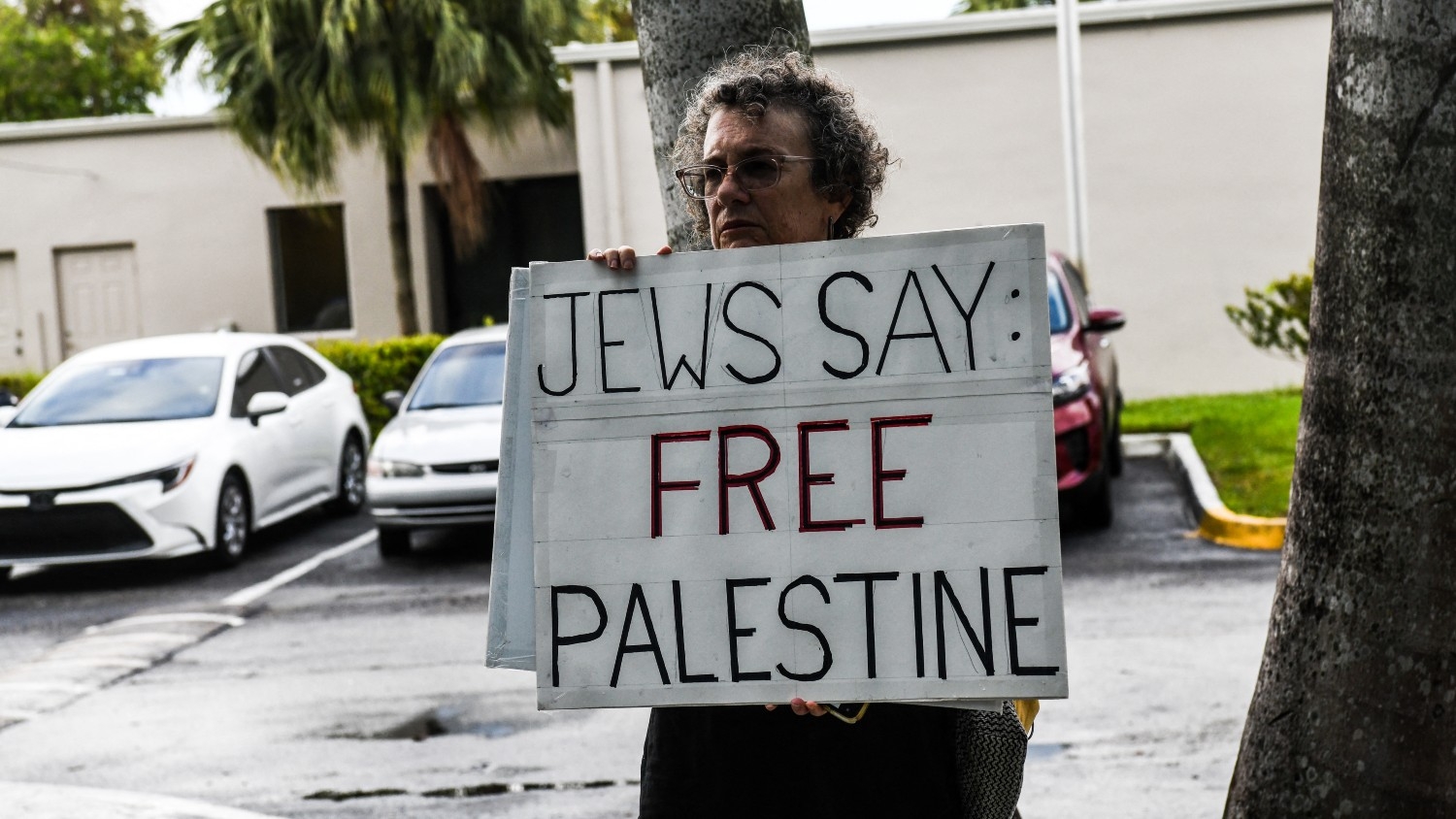
Israel's new government, expected to be the most right-wing in its history, has rattled segments of the American Jewish community, and even though many leading Jewish institutions are unlikely to change their approach to Israel, progressive Jews are optimistic the government's formation will open the community's eyes to Israel's treatment of Palestinians.
Activists have told Middle East Eye that Jewish institutions are likely remain steadfast in support of Israel, however, the new government risks pushing Jewish Americans to increasingly question those institutions' legitimacy as representatives of the community.
New MEE newsletter: Jerusalem Dispatch
Sign up to get the latest insights and analysis on Israel-Palestine, alongside Turkey Unpacked and other MEE newsletters
It could also force the Jewish community to further reckon with whether Israel has any interest in ending its occupation of the Palestinian territories.
Michael Koplow, director of the Israel Policy Forum, said in a recent op-ed that the new far-right coalition led by Benjamin Netanyahu alongside an alliance of ultra-Orthodox and ultra-nationalist parties was a "superstorm" about to hit the US Jewish community.
The outcome of the election has paved the way for a dramatic return to power for Netanyahu, the former prime minister, but the religious right-wing parties - including one led by lawmaker Itamar Ben-Gvir - have won big, and together are set to eclipse Netanyahu's dominance of the right in Israel. Furthermore, these politicians have previously advocated official ethnic cleansing and shoot-to-kill policies against Palestinians.
But so far, leading Jewish organisations in the US have not released overtly critical statements of the election results.
The American Jewish Committee, a pro-Israel Jewish advocacy group, said in a statement that "potential members of the governing coalition raise serious concerns", but nonetheless it remains committed to "continue to strengthen Israel's security and place in the world, enhance the deep bond between Israel and diaspora Jewry".
The Jewish Federation of North America, meanwhile, had no qualms with the results: "We look forward to working with the government selected by the Israeli people, as we always have."
"It's been like an expression of displeasure for many groups, but so far, there have been very few commitments to a change in policy or actions from American Jewish institutions," Mari Cohen, assistant editor at Jewish Currents, told MEE.
"There's definitely a concern, but I don't think that these groups are necessarily prepared to change their general relationships or approach to Israel as a whole."
Public perception
Still, the view towards Israel is already changing. After Israel's bombing of Gaza last May, 25 percent of American Jewish voters said Israel was an apartheid state, in a poll conducted by the Jewish Electorate Institute. Another 38 percent of voters said Israel's treatment of Palestinians was similar to general racism in the US.
Asaf Calderon, an Israeli citizen and social worker living in Brooklyn, New York, said he was not surprised by the results of the election, and noted that "racism, and fascism, have played deep roots in Israeli society".
But he believed that, given how far to the right the new government is, it could open people's eyes in the US as the country also faces a wave of right-wing politics since the election of former President Donald Trump in 2016.
"It might help people see Israel for what it is. It's unfortunate that the actions of the other Israeli governments over the years haven't led people to see it. But when the rhetoric is more obvious, more clearly racist, more people are going to be able to see," Calderon, who is also a member of Jewish Voice for Peace (JVP)'s New York City chapter, told MEE.
'Racism, and fascism, have played deep roots in Israeli society'
- Asaf Calderon
The divide overlaps with the American political landscape, as two major pro-Israel groups in the US, the American Israel Public Affairs Committee (Aipac) and the liberal Zionist group J Street, battled on opposing sides in a number of key congressional races during this year's midterm cycle.
A poll by J Street found 72 percent of Jewish voters disapproved of Aipac's decision to endorse and support congressional candidates who supported Israel but voted against certifying the 2020 presidential election.
J Street also said in a recent email to its supporters: "Trump uses antisemitic tropes to accuse us of 'disloyalty' to Israel. But we know supporting Israel's secure, democratic future does not mean backing Netanyahu and the settler movement."
"There already is a widening divide in American Jewish politics around Israel. It's already generationally divided. Younger Jews are statistically more likely to be critical and more likely to be disengaged. And I think that [the Israeli election] is just going to contribute to continuing that trend," said Cohen.
Phyllis Bennis, director of the New Internationalism Project at the Institute for Policy Studies, said that even though larger institutions were unlikely to change their stance on Israel, the election of the new far-right government will make it increasingly difficult for more liberal-leaning Jews and supporters of Israel to maintain that support.
"I think [the election results] will challenge supporters of Israel in the United States who like to believe that, yes, there are right-wing forces but there are also liberals, there's also centrist forces," Bennis told MEE.
"This is going to make it really hard because this coalition is going to be so far to the right that Benjamin Netanyahu will be the farthest left in his cabinet, which is extraordinary given that he has not changed any of his right-wing politics."
Starting point is Palestinian rights
Many progressive Jewish groups are also working to utilise the election of the far-right coalition in Israel as a means of educating Jewish Americans about the reality of Israel's occupation of Palestinians.
"If you look back 10 years ago, there was very wide consensus in the Jewish community around support for Israel no matter what. And due to the actions of Israel and the work of Palestinian and progressive Jewish activists, there has been more polarisation around Israel," Calderon said.
IfNotNow, a leading progressing Jewish organisation, held a protest earlier this month in Boston outside the Jewish National Fund (JNF) national conference, calling on conference attendees to stand against the new government and cut ties with the group, which has played a role in the ethnic cleansing of Palestinians.
"The victory of the Kahanist Jewish fascist and ethno-nationalist party is the result of apartheid," Violet Kopp, an IfNotNow volunteer, said in a statement. "Itamar Ben-Gvir took power because the Israeli establishment let him. The party's vision is one where discrimination and violence are used to trample on equality, freedom, and democracy."
Meanwhile, the larger Jewish community in the US will also have to reckon with the fact that the new government does not support an end to the occupation, given that it supports expanding settlements in occupied Palestinian territories. According to a 2020 poll from the Pew Research Center, 63 percent of Jewish Americans believe a peaceful two-state solution is possible.
Many leading human rights groups have described Israel as practicing apartheid because of its treatment of Palestinians. The United Nations' Special Rapporteur also came to the same conclusion.
And Netanyahu has already announced that he plans to legalise dozens of illegal settler outposts in the occupied West Bank, after a meeting with Ben-Gvir.
According to the Jewish Electorate Institute's poll from 2021, 58 percent of Jewish Americans said they support restricting US assistance to Israel in order to prohibit it from being spent on expanding settlements in the West Bank.
'One of the ways we fight for Palestinian rights is by educating people to say Israel is not a democracy'
- Phyllis Bennis, Institute for Policy Studies
Bennis, a former board member for JVP, said one of the tools available for advocacy is the point that Israeli politicians who are "supporters of extremist violent responses towards Palestinians" are likely to "be among the most powerful ministers in this new government".
"The starting point is still Palestinian rights. But one of the ways we fight for Palestinian rights is by educating people to say Israel is not a democracy. You can't be a democracy when you disenfranchise 20 percent of your own citizens and another equal number that are not citizens but that fall under your jurisdiction," she said.
Cohen noted that the divide within Jewish communities is growing as a result of a newer, younger generation coming to terms with Israeli policies towards Palestinians.
But given the responses so far of the major Jewish institutions, who at their most critical simply raised concerns about the new government, change is likely far from here.
"The institutional leadership traditionally tends to be much more supportive of Israel and very committed to those politics," said Cohen. "So even when we see a change of American Jewish opinion on the ground, that doesn't necessarily translate to a representative change in institutional behaviour."
Middle East Eye delivers independent and unrivalled coverage and analysis of the Middle East, North Africa and beyond. To learn more about republishing this content and the associated fees, please fill out this form. More about MEE can be found here.


